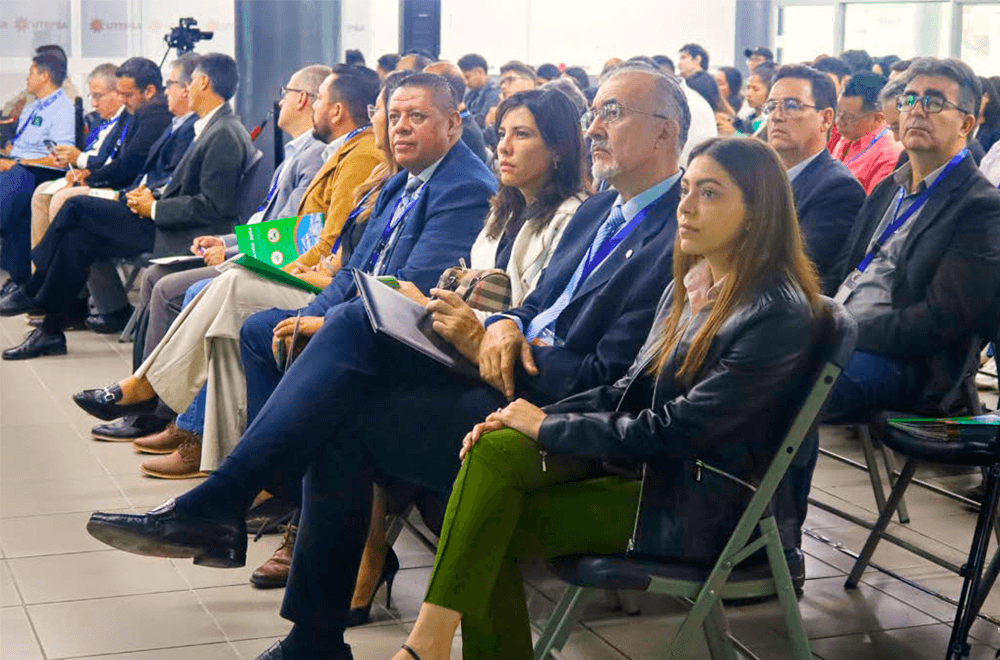
Forum of the AEE recommends UPDATING ENERGY POLICY IN BOLIVIA
Important actors of the sector and collateral companies expressed the importance of updating the regulations of the energy sector in Bolivia as a significant step to improve energy management and efficiency…
EDICIÓN 129 | 2024
Vesna Marinkovic U.
The impact of energy subsidies in Bolivia and their consequences; energy management and lithium development were the central topics of the event called "International Forum: Energy Context in Bolivia by 2030," highlighted the organizers, Oscar Siles and Ricardo Carrillo, president and vice president of the Association of Energy Engineers (AEE), Bolivia chapter, during the monthly colloquium of the magazine.
Both professionals pointed out the importance of these spaces for reflection on the sector, stating that regarding the subsidies and their impact on the national economy, there was an emphasis on finding viable alternatives for their continuity, considering their critical influence on the country's stability. Likewise, they emphasized the need to design comprehensive national strategies that address this challenge, incorporating various variables for gradual and sustainable reduction.
"In parallel, greater investment and incentives for oil operators should be promoted to increase exploration and hydrocarbon production," said Oscar Siles, highlighting the central recommendations of the event, which addressed the need for accelerated incorporation of renewable electric generation at market prices.

“It was also emphasized the importance of establishing specific policies and actions that promote energy efficiency, reduce dependency on subsidies, and promote the development of emerging energy technologies...”
Regarding the second axis of the event, Ricardo Carrillo said that the urgent need to improve it was evident as a central part of any energy transition globally and particularly in Bolivia. "At the local, regional, and global levels, energy efficiency represents one of the main pillars with significant weight," he emphasized.
THE IMPORTANCE OF EDUCATION
The president of the AEE Bolivia Chapter placed special emphasis on the importance of educational processes by stating that "during the event, it was recognized that significant challenges persist in our country regarding the promotion of an educational culture on energy efficiency, highlighting the importance of addressing this deficiency as a priority issue on the national energy agenda”.
"We agreed on the imperative need to deepen the application of energy management standards at the national level in different sectors such as industry, infrastructure, residential, commercial, rural, among others," said Siles.
ON DISTRIBUTED GENERATION
Later, Carrillo mentioned the evidence that distributed generation has not yet taken off in its application as expected since the promulgation of Supreme Decree 4477 in March 2021, due to various factors that have limited its application, both from the user side and from the distributing companies.

According to Sergio Arnéz, an expert in the field, "basically, the Decree defines that consumers of distribution networks may install their own generation from renewable sources up to a power of 350 kW, that the installation must be carried out by installers authorized by the Distributor and registered with the Electricity and Nuclear Technology Authority (AETN), that the Distributor will approve the installation and connection, and that the AETN will regulate the method of compensation for energy injected into the grid, as well as the necessary procedures for the processes."
Arnéz considers that this issue does not advance even at the level of implementing existing regulations (making them applicable to the user), let alone speaking of their effectiveness once implemented, because it lacks the necessary support.

the conclusions drawn across the topics addressed in this event are related to the pressing need to integrate key actors in the country's energy transition...”
from the electricity sector due to the following fundamental fears: 1) it is believed that DG could experience explosive growth to levels that would jeopardize system operation (frequency control, line and transformer overload, etc.); 2) it is not clearly established that the costs (losses) incurred by the implementation of DG will be recognized by the Distributors; and 3) it is believed that increasing end-user tariffs to cover the previous point could bring problems.
ON LITHIUM
Regarding the third theme of the forum, focused on emerging technologies in the energy field, such as lithium development, green hydrogen, and electromobility, Siles said there was agreement in noting that electromobility will only contribute to reducing carbon emissions if it is associated with renewable electricity, which if it happens, will increase the electric vehicle fleet and reduce gasoline and CNG consumption mainly.
He added that as a recommendation, it was urgent to "transparently inform the population about the relationship between existing lithium resources and reserves in Bolivia to avoid generating false expectations and to project the development and exploitation of this strategic resource."
"It was emphasized the need not only to advance technical solutions, but also in parallel, to establish a solid regulatory, legal, and regulatory framework that facilitates its development and integration into the national energy matrix," highlighted Siles, adding that the success of these emerging technologies depends largely on a favorable environment that promotes investment and innovation.
"At the Energy Forum, the interrelation between these three themes was highlighted, emphasizing the need to address them comprehensively to ensure a sustainable and timely energy transition in Bolivia. It was also emphasized the importance of establishing specific policies and actions that promote energy efficiency, reduce dependency on subsidies, and promote the development of emerging energy technologies, in order to ensure a more resilient and sustainable energy future for the country," Carrillo said in turn.
For Siles, the conclusions drawn across the topics addressed in this event are related to the pressing need to integrate key actors in the country's energy transition, such as the State, industry, academia, and organized civil society. "This complex task must be assumed and led by the State administrator, which is the central, departmental, and municipal government, but under a systemic and holistic vision," he said.
This event, in its second version, brought together industry players and sectors including electricity, oil and gas, petrochemicals, mining, agribusiness, cement, sugar, automation, construction, transportation, among others, all of which are key to the country's energy development, highlighting the importance of promoting renewables amid the decline of natural gas fields.
Finally, both actors in the sector expressed the need to update the country's energy policy and then also have a new strategy around energy management in Bolivia and thus properly guide the course of this sector, which cuts across the national economy.











